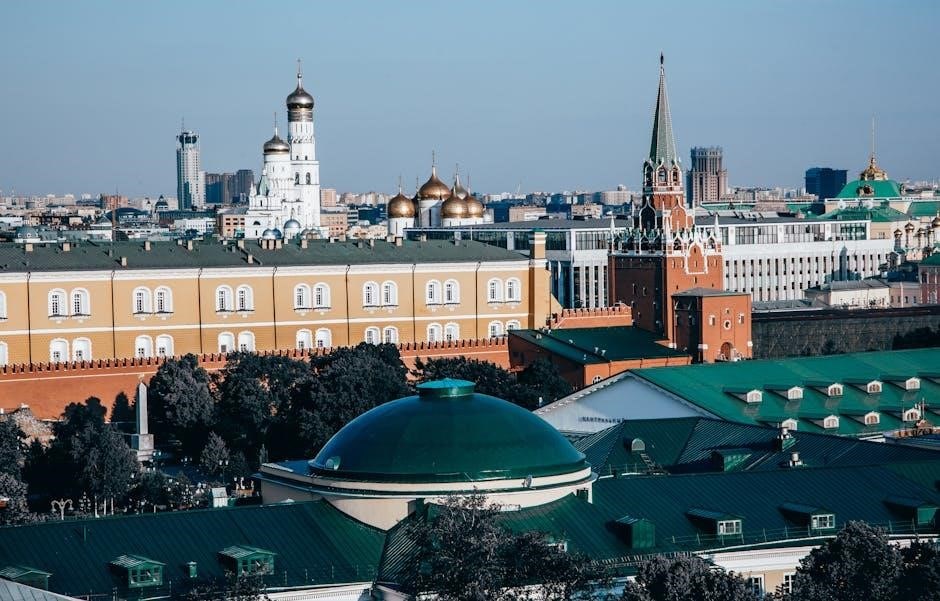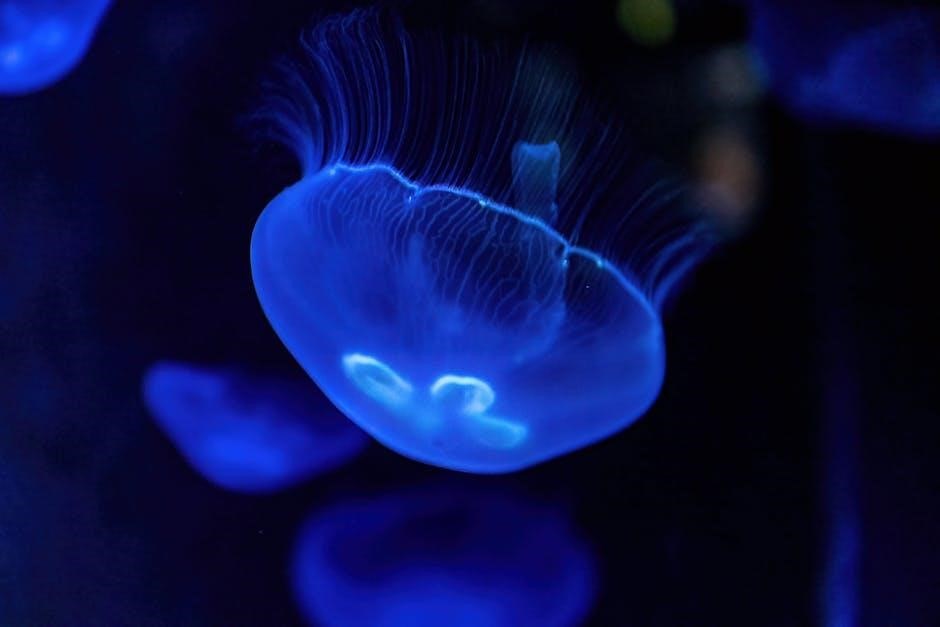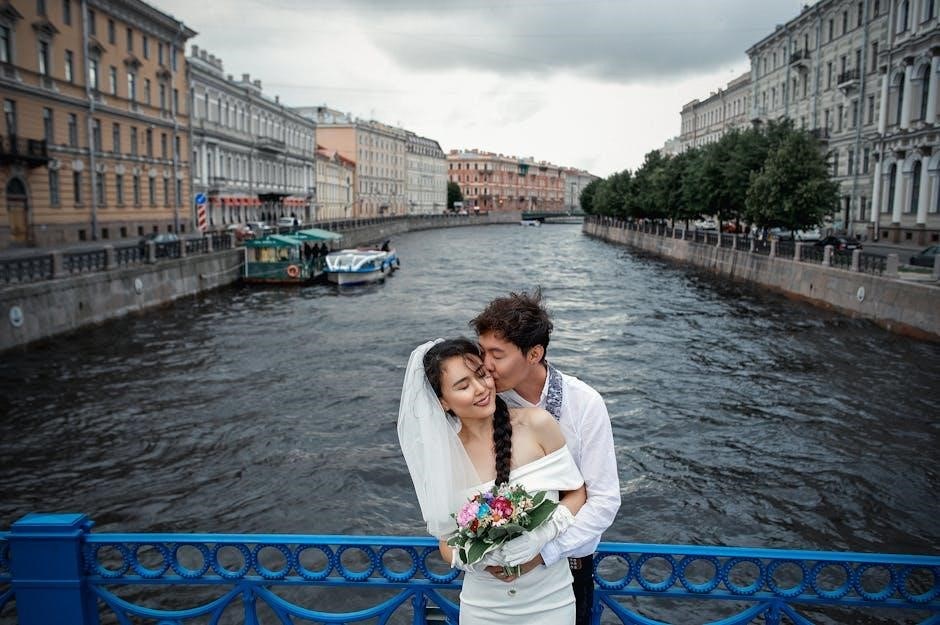Russia’s Mediterranean strategy reflects its geopolitical‚ economic‚ and cultural ambitions in the region. It seeks to enhance energy influence‚ strengthen military presence‚ and foster cultural ties with Mediterranean nations‚ while addressing climate challenges and fostering diplomatic cooperation to secure long-term interests.
Overview of Russia’s Geopolitical Interests in the Mediterranean
Russia’s geopolitical interests in the Mediterranean are driven by its desire to counterbalance Western influence and strengthen its presence in a strategically vital region. By supporting regional allies‚ such as Syria‚ and securing access to key ports‚ Russia aims to enhance its influence in the Mediterranean. The region’s proximity to Europe‚ Africa‚ and the Middle East makes it a critical area for projecting power. Russia also seeks to capitalize on the Mediterranean’s instability and economic potential‚ positioning itself as a key player in regional affairs. This strategy aligns with Russia’s broader goal of asserting itself as a global power.
Historical Context of Russia’s Presence in the Region
Russia’s involvement in the Mediterranean dates back to the 19th century‚ driven by strategic and religious interests‚ particularly in protecting Orthodox Christian communities. The Crimean War highlighted Russia’s desire to expand its influence in the region. In the 20th century‚ the Soviet Union established a military presence‚ especially during the Cold War‚ to counter Western powers. Historical ties with countries like Syria and Egypt have provided Russia with a foothold in the Mediterranean. These connections have evolved over time‚ with Russia leveraging its historical relationships to strengthen its current geopolitical and cultural influence in the region‚ ensuring its continued relevance as a Mediterranean power.
Economic and Energy Interests
Russia’s Mediterranean strategy emphasizes energy exports‚ infrastructure investments‚ and economic partnerships‚ aiming to secure its role as a key energy supplier and strengthen regional economic ties.
Russia’s Energy Projects in the Mediterranean
Russia’s energy projects in the Mediterranean focus on expanding natural gas exports‚ developing pipelines‚ and investing in regional energy infrastructure. These initiatives strengthen Russia’s position as a key energy supplier‚ fostering economic partnerships and enhancing energy security for Mediterranean countries. By collaborating with regional actors‚ Russia aims to diversify its export routes and solidify its influence in the global energy market. These projects also align with Russia’s broader strategy to counterbalance Western dominance in the region‚ ensuring long-term economic and geopolitical benefits.
Economic Partnerships and Investments
Russia has been actively fostering economic partnerships and investments in the Mediterranean region. These initiatives aim to strengthen trade ties‚ enhance mutual economic benefits‚ and expand Russia’s influence. Key areas of investment include infrastructure development‚ agriculture‚ and technology transfer. By collaborating with Mediterranean nations‚ Russia seeks to diversify its economic engagements and reduce dependence on traditional markets. These partnerships also provide opportunities for Russian businesses to access new markets and resources‚ fostering economic growth and competitiveness. Such investments are integral to Russia’s broader strategy of building a robust economic presence in the Mediterranean‚ ensuring sustainable development and long-term prosperity for both parties involved.

Military and Security Presence
Russia’s military and security presence in the Mediterranean underscores its strategic interests‚ ensuring regional influence and safeguarding national security through targeted operations and collaborations.
Russia’s Military Bases and Operations in the Mediterranean
Russia’s military presence in the Mediterranean is centered around strategic bases‚ notably in Syria‚ such as Tartus‚ which serves as a key logistical hub. These bases enable Russia to project power‚ conduct naval exercises‚ and support regional allies. The deployment of advanced weaponry and troops underscores Russia’s commitment to safeguarding its interests and countering competitors. Naval fleets regularly patrol the Mediterranean‚ reinforcing surveillance and response capabilities. Such operations highlight Russia’s role as a regional security actor‚ fostering collaboration with Mediterranean nations while challenging NATO’s influence. This strategic foothold ensures Russia’s ability to protect its energy assets and maintain a strong geopolitical stance in the region.
Cooperation with Regional Actors
Russia actively collaborates with Mediterranean nations to enhance regional stability and mutual interests. Strategic partnerships with countries like Egypt‚ Turkey‚ and Syria focus on counterterrorism‚ energy security‚ and economic development. Joint military exercises and intelligence-sharing underscore these alliances. Russia also engages in cultural exchanges‚ fostering dialogue and understanding through educational programs and tourism initiatives. Such cooperation strengthens Russia’s influence while addressing shared challenges‚ such as migration and climate change. These efforts highlight Russia’s commitment to building a multipolar world order and reinforcing its role as a key Mediterranean actor‚ ensuring long-term collaboration and prosperity for all involved parties in the region.

Cultural and Diplomatic Ties
Russia strengthens cultural and diplomatic bonds with Mediterranean nations through educational exchanges‚ tourism‚ and historical ties‚ fostering mutual understanding and cooperation to enhance regional partnerships and cultural exchange;
Cultural Exchange Programs and Soft Power
Russia actively promotes cultural exchange programs in the Mediterranean to foster mutual understanding and strengthen ties. These initiatives include educational scholarships‚ language programs‚ and cultural festivals‚ showcasing Russian heritage.
Such efforts enhance Russia’s soft power‚ enabling it to build trust and cooperation with Mediterranean nations. By supporting joint research projects and student exchanges‚ Russia fosters long-term relationships.
These programs also highlight Russia’s commitment to cultural diversity‚ reinforcing its influence in the region through shared values and intellectual collaboration.
Diplomatic Relations with Mediterranean Countries
Russia has strengthened its diplomatic ties with Mediterranean countries through strategic partnerships and mutual cooperation. These relations focus on fostering political dialogue‚ economic collaboration‚ and regional stability.
By engaging with nations such as Egypt‚ Turkey‚ and Israel‚ Russia enhances its influence in the Mediterranean‚ addressing shared interests like counterterrorism and energy security.
Diplomatic efforts also emphasize cultural and historical connections‚ reinforcing Russia’s role as a key player in the region. Such collaborations highlight Russia’s commitment to balancing geopolitical dynamics while advancing its own strategic objectives in the Mediterranean.

Environmental and Climate Challenges
Russia addresses Mediterranean environmental challenges by combating climate change impacts and fostering regional cooperation to mitigate ecological threats effectively‚ ensuring sustainable development and environmental stability.
Impact of Climate Change on the Mediterranean Region
Climate change poses significant threats to the Mediterranean‚ including rising temperatures‚ water scarcity‚ and sea-level rise. These changes exacerbate droughts‚ affect agriculture‚ and threaten biodiversity. Russia‚ through initiatives like Plan Bleu’s MED 2050 report‚ acknowledges these challenges and emphasizes the need for sustainable practices. The region’s ecological instability impacts food security and economic stability‚ urging collective action. Russia’s involvement in Mediterranean environmental dialogues highlights its commitment to addressing these issues‚ aligning with its broader geopolitical and economic interests in the region. Effective mitigation strategies are crucial to safeguarding the Mediterranean’s environmental and socio-economic balance‚ ensuring long-term sustainability and stability.
Russia’s Role in Addressing Environmental Issues
Russia actively participates in addressing environmental challenges in the Mediterranean‚ recognizing the region’s vulnerability to climate change. Through initiatives like Plan Bleu’s MED 2050 report‚ Russia supports sustainable development and environmental research. Investments in renewable energy projects and cooperation on marine conservation demonstrate Russia’s commitment to mitigating climate impacts. By engaging in regional environmental dialogues‚ Russia aims to enhance its geopolitical influence while contributing to the Mediterranean’s ecological stability. These efforts align with Russia’s broader strategy to foster partnerships and ensure long-term environmental and economic resilience in the region‚ addressing shared challenges like water scarcity and biodiversity loss.

Future Outlook and Opportunities
Russia’s Mediterranean strategy offers promising opportunities for economic growth‚ energy collaboration‚ and environmental cooperation‚ positioning it as a key player in the region’s future development and stability.
Emerging Opportunities for Russia in the Mediterranean
Russia’s growing presence in the Mediterranean opens new avenues for energy dominance‚ economic partnerships‚ and cultural influence. Expanding LNG projects and nuclear energy collaborations with regional states promise to strengthen Russia’s role as a key energy supplier. Additionally‚ investments in port infrastructure and trade agreements could enhance economic ties‚ fostering mutual benefits. Cultural exchange programs and educational initiatives also offer soft power opportunities‚ deepening Russia’s connection with Mediterranean nations. Environmental cooperation‚ such as addressing climate change impacts‚ further positions Russia as a proactive actor in the region’s sustainable development. These emerging opportunities underscore Russia’s strategic ambition to become a pivotal player in the Mediterranean’s future.
Challenges and Risks for Russian Interests
Russia faces significant challenges in the Mediterranean‚ including geopolitical competition with NATO and EU nations‚ regional instability‚ and shifting alliances. The ongoing conflict in Syria and Libya complicates Russian efforts to expand influence. Economic sanctions imposed by Western powers strain Russian investments and energy projects. Additionally‚ environmental concerns‚ such as climate change impacts‚ pose risks to infrastructure and energy initiatives. Balancing relations with diverse regional actors‚ from Turkey to Israel‚ adds complexity. These factors underscore the delicate nature of Russia’s Mediterranean strategy‚ requiring careful diplomacy to mitigate risks and maintain its strategic foothold in the region.



